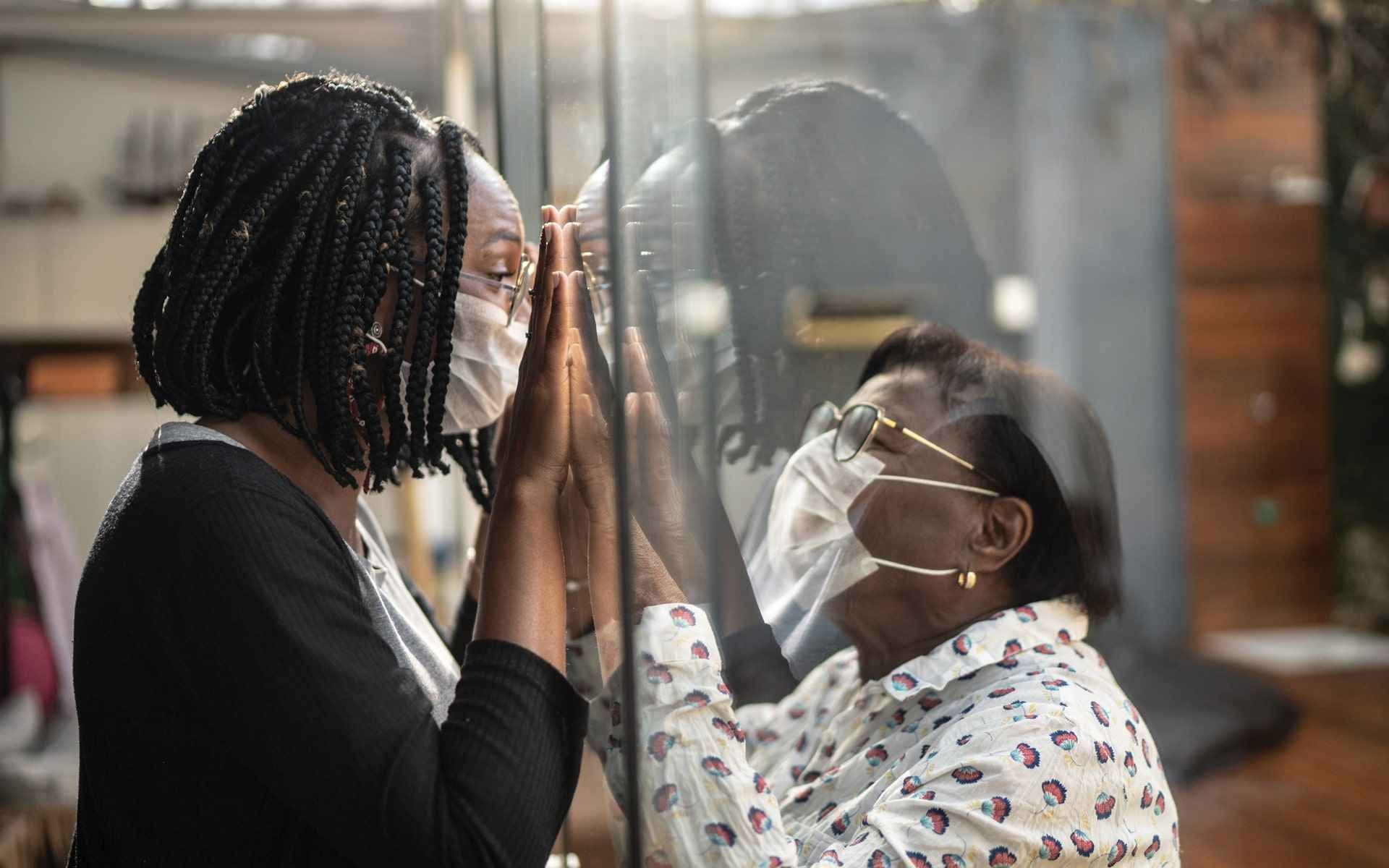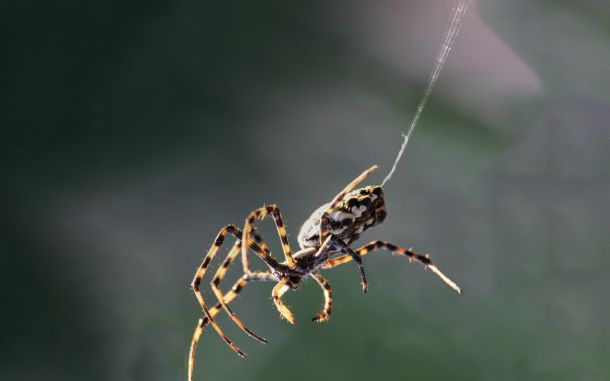Homo Covidicus

In This Article
-
When the pandemic started, nobody was ready to accept this new reality that reminds you more of an anti-utopia.
-
In this teeny-tiny world, a biological virus can affect all of humanity in two shakes. Like a computer virus – in two clicks.
-
A new life code required a new language to explain phenomena that emerged.
It was YOU – 2006 Person of the Year according to Time magazine. You – meaning user who contributes to the Internet. Homo Interneticus, in other words. You could even see your face in the glossy mirror surface on a magazine cover. And, here’s the trick – YOU should have been chosen as 2020 Person of the Year, though with a different status quo now – Homo Covidicus. You too can see yourself in all the reflective surfaces: a face covered with a mask. A similar mask underneath a similar face. A faceless human in a bedsheet bag, breathing through it, talking through it, kissing through it. Just like Magritte’s famous paintings.
Talk to me, Homo Covidicus. Tell me your stories to share with our next generation – Homo (hopefully) Post-Covidicus.
– I am tired of this endless medical treatment, dear. Please let me go.
When it all started, nobody was ready to accept this new reality that reminds you more of an anti-utopia. “It’s far away, on another hemisphere of the planet,” some of us thought. “It’s all fake news and provocation,” others calmed themselves down. “Isn’t it a new TV show?” It was not. The global village, as Marshall McLuhan called our digital mobile world, appeared to be small indeed. In this teeny-tiny world, a biological virus can affect all of humanity in two shakes. Like a computer virus – in two clicks.
– Mom, why do all people “muzzle” their faces like doggies?
So, our global village was not ready for such a new challenge. Neither governments with international organizations, nor the medical sphere with world scientists. It was out of the blue and beyond human comprehension. A new protective dress code was not enough. There was a need for a new life code. And for a new way of thinking in particular. Still, as we all perfectly know now, it was not a matter of one day. Of one lost life. (Unless it’s your life, of course, or the life of your loved ones.)
– Have you ever seen so many wild rabbits peacefully walking on the city streets? They aren’t even afraid of the clamorous echoes of ambulance sirens!
A new life code required a new language to explain phenomena that emerged. Like George Orwell’s Newspeak in his 1984 novel. Covid dystopia needed some kind of Covidspeak. A new lexicon appeared instantly and was spread virally from mouth to mouth, easily overcoming masks, protective shields, walls, and quarantine lockdowns, like a bio virus itself. Soon, we all got used to those strange frightening words such as antigen test, PPE, Coronavirus, pandemic, quarantine, self-isolation, SARS-CoV-2, super-spreader, transmission, viral shedding, and many more. Sounds like a transcript to the sequel to Alien, right? Alas. It’s been a scenario based on real, ongoing facts with you us as protagonists.
– Let’s do a covideo party! I’ll have a beer… hm…“Corona Extra”! And you?
To euphemize a severe reality, Homo Covidicus started coining funny neologisms and paraphrases in one’s native languages (some of them available on #ReframeCovid.) For example, “covidiot” (someone who ignores public health advice), “covideo party” (online party via Zoom or Skype), “covexit” (a strategy for exiting lockdown), “zoomby” (Zoom user), “zoombombing” (hijacking a Zoom video call), “WFH” (working from home), “quaranteams” (online teams created during lockdown), etc. Nevertheless, it’s hard to laugh in the face of “covidance.”
- Excuse me sir, your temperature is higher than normal. I’m afraid I can’t let you in.
Communication itself has become different. First and foremost, because of mediation. The word online became so ordinary that we somehow didn’t notice when an authentic word live was replaced into the artificial offline. Foci have been changed. Our conversations have turned into zoomversations. With a comfortable option to turn off your video camera, to mute yourself, to become just a black Malevich square on somebody’s monitor. To stay invisible but still present. Or vice versa – to pretend presence while you are absent. A new way of digital mimicry. Zoomversation as a nonversation. Homo Covidicus, you we are true virtuosos in this craft! Hence, speaking into the monitor has become speaking into the air. In the meantime, speaking into the real air has taken on a new semantic shade and nostalgic taste.
– All of them… they die in complete loneliness in their wards. Relatives are not allowed to take care of them during their last hours. No one holds their hands as they pass away.
Technology. It has become deeply rooted into our bodies, converting into extensions of our body parts. It was actually predicted by media and communication research half a century ago (M. McLuhan, N. Postman, G. Sartory, etc.). Homo Covidicus has been becoming transformed into such a Techno Centaurus – with technology instead of part of a horse. With a third digital arm or a third organic ear, like in the anthropo-digital experiments of the Australian performer Stelarc. All those smart phones, tablets, monitors, our faithful slaves, our true angels, our digital bodyguards gradually and unnoticeably have been turning us into their slaves. “Oh Ford!” – we can revoice Aldous Huxley’s heroes from Brave New World. Our world, though, has no arguments to declare itself brave any more.
– Hello? Please help me. I’m… ummmm… a victim of domestic abuse. I have no place to escape from this lockdown cage… I need legal assistance.
And so, we have started to appreciate simple things again. Open faces. Scents and touches. Smiles and kisses. Handshakes and hugs. It appeared that communication online loses its main features: affinity, intimacy, closeness, inner light, half-tones, micro-moves. The main optics and micro-proxemics in a true relationship. True signs of love. Thus, Homo Covidicus got tired of the necessity of being connected without true connection. Of being mobile without true motion. Of staying tuned without real engagement. Tired from all that complete simulacrum. Seems like a materialization of the Wachowskis’ The Matrix, isn’t it? The main difference here is – we all realize our condition. And that very insight brings even more drama into our lives.
– My apology ma’am, your Covid test is positive. You can’t cross our border. Our officer will escort you to Gate 57 now, and you will be immediately sent back to your country on a special emergency flight.
Homo Covidicus started to treasure its life space by means of its functionality. We used to recognize things only when we would lose them. The same thing here: we started to treasure home only after it had become our office, our daily working space. Not a place to escape from daily routine, deadlines, colleagues, and duties, not a comfort zone anymore. Not a reliable shelter to hide from this fussy world. Homo Covidicus has missed its own home at home.
– Dear, should we order pizza or go to the nearest McDonalds drive-through?
Our daily routine has been utterly changed. We now need to share space with other family members, organize our working place taking into consideration all things that might happen and do usually happen everywhere at home (especially pop-in-pets, pop-up-kids, anything that can unexpectedly break through your defense.) On the other hand, we are trying not to cross someone else’s work frontier. Therefore, we need to correlate our schedules and Zoom-meetings in advance, arranging beforehand who will guard the relative quietness on each other’s backstage, who will carry all those things on his or her shoulders like Atlas. Until it’s finally your turn for Zoom, and now you can shrug with relief.
– Mom, dad fell asleep and I need to pee… hey! [waiving hello to mom’s colleagues via the unmuted Zoom].
Homo Covidicus became similar to the Ancient Greeks and Romans who gave the instruction Memento Mori! (remember your mortality) and Carpe diem! (seize the day). Now, Homo Covidicus does count every day of his/her life, does remind him/herself of the inevitability of death. One by one losing his/her relatives, friends, colleagues, neighbors, lovers, teachers, favorite movie actors, football players, musicians, and… maybe even themselves. There is not a single Homo Covidicus who would not lose a loved one. Otherwise s/he cannot be a true Homo Covidicus.
– My oxygen saturation has rapidly gone down; I can hardly speak now. I’ve sent you all the passwords to my credit cards and accounts. Don’t cry. Save them. Just in case…
Just in case – is the most common phrase, if not on the tips of our tongues, then in between our lines. During the pandemic, our relatives have become as close to us as they have never been before. Paradoxically, these walls make people closer. More sensitive, kind, caring, thoughtful, religious, and prayerful. More open and empathic. More human. Homo Covidicus has re-identified (Covidentified?) him/herself first and foremost as homo.
– Tell me how she died, dad, tell me everything in detail. Take pictures at her burial, of her lying in the coffin. Promise me! I need to have it in my memories too, in my mind, as if I were there with you, across the Atlantic.
The New York Times published “An Incalculable Loss” on 24 May 2020. Its first page was fully covered with names and brief descriptions of the “grim milestone” of 100,000 Americans who had died from coronavirus. A new tragic chapter in a new history. A new way of paying tribute to victims. A new way of storytelling: Marion Krueger, 85, Kirkland, Wash. Great-grandmother with an easy laugh. John-Sebastian Laird-Hammond, 59, Washington D.C. Member of a Franciscan monastery. George Freeman Winfield, 72, Shelburne, Vt. Could make anything grow. Kious Kelly, 48, New York City. Nurse in the Covid fight. Wanda Bailey, 63, Crete, Ill. One of nine siblings. Skylar Herbert, 5, Detroit. Michigan’s youngest victim of the coronavirus pandemic (…)
– Can you write there simply: Loved her children? That’s all I want.
My seven-year-old daughter asked me once what number COVID is. I didn’t understand her question until she explained it to me. At school, they had just learned numbers written in Roman numerals. And, if to look at the word COVID from that prospective, you can identify many Roman numerals there. Indeed! “It’s a tricky word,” I answered my daughter. “Because nobody knows its exact number. The number of people it would stop on.” Then she told me that this number-word should be positive no matter what, because it had her favorite V within it. Her favorite V reminded her of a flying bird.
– Can you take care of my Brisko, if… if… you know what I mean. Would you?
Now I, too, see a flying bird in this frightening number-word. I see how much we have all learned from this “lesson.” How devotedly we can fight for those whom we love and for those whom we see for the first time in our lives. How cohesively we can support each other by singing all together from our condo balconies or buying and leaving groceries near our neighbor’s doors. How inventive we have been to unlock this lockdown with omni-purpose keys of love, faith, and humanity.
“Sometimes / the iron in a lock / must be thinking / why was I moulded / into something as such! / A life that came / with boldness /got swept into / isolation — by the tongue / of a melancholic rust / hanging like a slave / to the will of the key / and fingers.” [“Locked” by Sonnet Mondal].
So, who are you – Homo Covidicus? Who are we? Bones of Bones, flesh of Flesh, homo of Homo? “Moulded into something as such.” What is your mission on this Earth? What is your fate? What is your covidentification? For how long will your shadow be shrouding your light ahead? What is your swan song, Homo Covidicus? What is your main story among all of them? I cannot choose – all of them reveal your our soul.
– Can you smell the coffee? Are you sure? Thank God.








